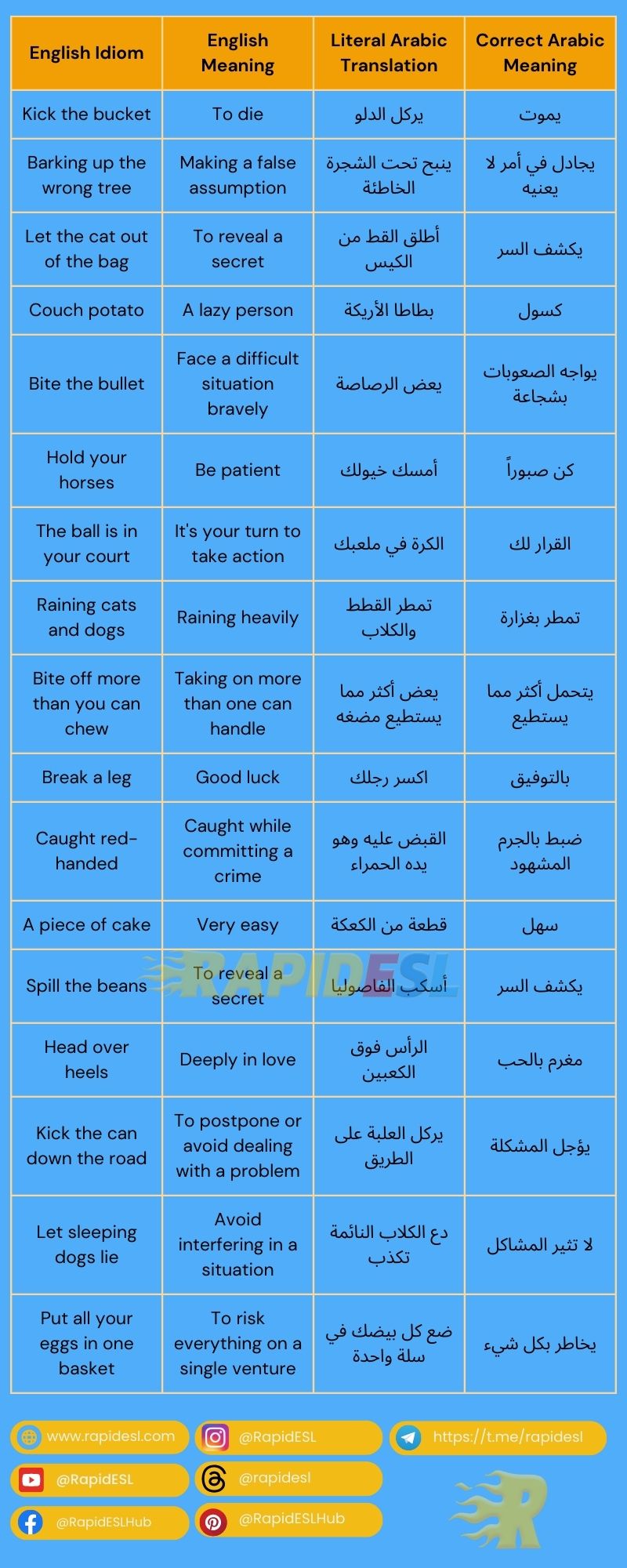
English in Arabic: 17 English Idioms that Have Funny Arabic Translations
Language, whether English or Arabic, is full of idioms that can confuse learners due to their figurative, not literal, meanings. When these idioms are translated into another language, they can often result in funny or unusual interpretations. Let’s see examples of how English in Arabic might sound with this list of 17 English idioms that have humorous Arabic translations.
Funny Meaning of English Idioms in Arabic
-
‘Kick the bucket’
In English, this is a euphemism for dying. The literal Arabic translation, ‘يركل الدلو’ or ‘kicks the bucket’, might leave Arabic speakers baffled as to how a bucket-kicking action relates to death.
-
‘Barking up the wrong tree’
This idiom means to make a false assumption about something. Literally translated into Arabic, it becomes ‘ينبح تحت الشجرة الخاطئة’ or ‘barking under the wrong tree’, which might sound comical for Arabic speakers.
-
‘Let the cat out of the bag’
In English, this means to reveal a secret. However, the literal Arabic translation, ‘أطلق القط من الكيس’ or ‘let the cat out of the bag’, could leave Arabic speakers wondering why there was a cat in the bag in the first place!
-
‘Couch potato’
This refers to a lazy person who spends a lot of time watching TV. The literal Arabic translation, ‘بطاطا الأريكة’ or ‘couch’s potato’, sounds amusing and might invoke imagery of a potato sitting on a couch.
-
‘Bite the bullet’
This means to face a difficult or unpleasant situation bravely. In Arabic, ‘يعض الرصاصة’ or ‘bite the bullet’ could create an image of someone literally trying to bite a bullet!
-
‘Hold your horses’
A request to be patient, this idiom might puzzle Arabic speakers when translated to ‘أمسك خيولك’ or ‘hold your horses’, as it’s unlikely they would be holding many horses in a literal sense.
-
‘The ball is in your court’
This idiom is used to express that it’s someone else’s turn to take action. The Arabic equivalent ‘الكرة في ملعبك’ or ‘the ball is in your court’ might seem strange, especially if there’s no sport being played!
-
‘Raining cats and dogs’
This means it’s raining heavily. Arabic speakers might find it humorous when translated to ‘تمطر القطط والكلاب’ or ‘raining cats and dogs’, as this would create an image of pets falling from the sky.
-
‘Bite off more than you can chew’
This idiom refers to taking on more responsibilities than one can handle. In Arabic, ‘يعض أكثر مما يستطيع مضغه’ or ‘bite more than he can chew’ could create a funny image of someone trying to eat a too-large piece of food.
-
‘Break a leg’
An unconventional way to wish someone luck in English. The Arabic translation, ‘اكسر رجلك’ or ‘break your leg’, might sound more like a curse than a wish of good fortune.
-
‘Caught red-handed’
This phrase means to be caught while committing a crime or wrongdoing. The Arabic translation, ‘القبض عليه وهو يده الحمراء’ or ‘caught with his red hand’, might make Arabic speakers imagine a person with a literally red hand!
-
‘A piece of cake’
In English, this means something is very easy. But the literal Arabic translation, ‘قطعة من الكعكة’ or ‘piece of cake’, might have Arabic speakers wondering about the connection between cake and ease.
-
‘Spill the beans’
This idiom means to reveal a secret. The Arabic translation, ‘أسكب الفاصوليا’ or ‘spill the beans’, would likely cause confusion and laughter as people wonder why anyone was spilling beans.
-
‘Head over heels’
This phrase describes someone who is being deeply in love. The literal Arabic translation, ‘الرأس فوق الكعبين’ or ‘head over heels’, might sound like an uncomfortable physical position rather than a state of emotional euphoria.
-
‘Kick the can down the road’
This idiom refers to postponing or avoiding dealing with a problem. In Arabic, ‘يركل العلبة على الطريق’ or ‘kick the can on the road’, could create a funny image of someone literally kicking a can on the road.
-
‘Let sleeping dogs lie’
This means to avoid interfering in a situation that is currently causing no problems. In Arabic, ‘دع الكلاب النائمة تكذب’ or ‘let sleeping dogs lie’, might sound like a bizarre advice about canine behavior.
-
‘Put all your eggs in one basket’
This means to risk everything on a single venture. The Arabic translation, ‘ضع كل بيضك في سلة واحدة’ or ‘put all your eggs in one basket’, might lead Arabic speakers to question the wisdom of egg placement.
And if you’re wondering, here is the list of idioms with their correct Arabic meanings:
| English Idiom | English Meaning | Literal Arabic Translation | Correct Arabic Meaning |
| Kick the bucket | To die | يركل الدلو | يموت |
| Barking up the wrong tree | Making a false assumption | ينبح تحت الشجرة الخاطئة | يجادل في أمر لا يعنيه |
| Let the cat out of the bag | To reveal a secret | أطلق القط من الكيس | يكشف السر |
| Couch potato | A lazy person | بطاطا الأريكة | كسول |
| Bite the bullet | Face a difficult situation bravely | يعض الرصاصة | يواجه الصعوبات بشجاعة |
| Hold your horses | Be patient | أمسك خيولك | كن صبوراً |
| The ball is in your court | It’s your turn to take action | الكرة في ملعبك | القرار لك |
| Raining cats and dogs | Raining heavily | تمطر القطط والكلاب | تمطر بغزارة |
| Bite off more than you can chew | Taking on more than one can handle | يعض أكثر مما يستطيع مضغه | يتحمل أكثر مما يستطيع |
| Break a leg | Good luck | اكسر رجلك | بالتوفيق |
| Caught red-handed | Caught while committing a crime | القبض عليه وهو يده الحمراء | ضبط بالجرم المشهود |
| A piece of cake | Very easy | قطعة من الكعكة | سهل |
| Spill the beans | To reveal a secret | أسكب الفاصوليا | يكشف السر |
| Head over heels | Deeply in love | الرأس فوق الكعبين | مغرم بالحب |
| Kick the can down the road | To postpone or avoid dealing with a problem | يركل العلبة على الطريق | يؤجل المشكلة |
| Let sleeping dogs lie | Avoid interfering in a situation | دع الكلاب النائمة تكذب | لا تثير المشاكل |
| Put all your eggs in one basket | To risk everything on a single venture | ضع كل بيضك في سلة واحدة | يخاطر بكل شيء |
As you might guess, these idioms and their translations can bring humor into language learning, making it a more enjoyable process. It’s also a great way to realize the importance of cultural nuances in language and how translations can often involve more than just substituting words from one language into another. Understanding the figurative meanings behind idioms is a key step in becoming proficient in a new language. So, don’t be a ‘couch potato’, ‘bite the bullet’, and continue exploring and learning idioms, no matter how funny they may sound in your native language!

You can download this table in PDF format here!
